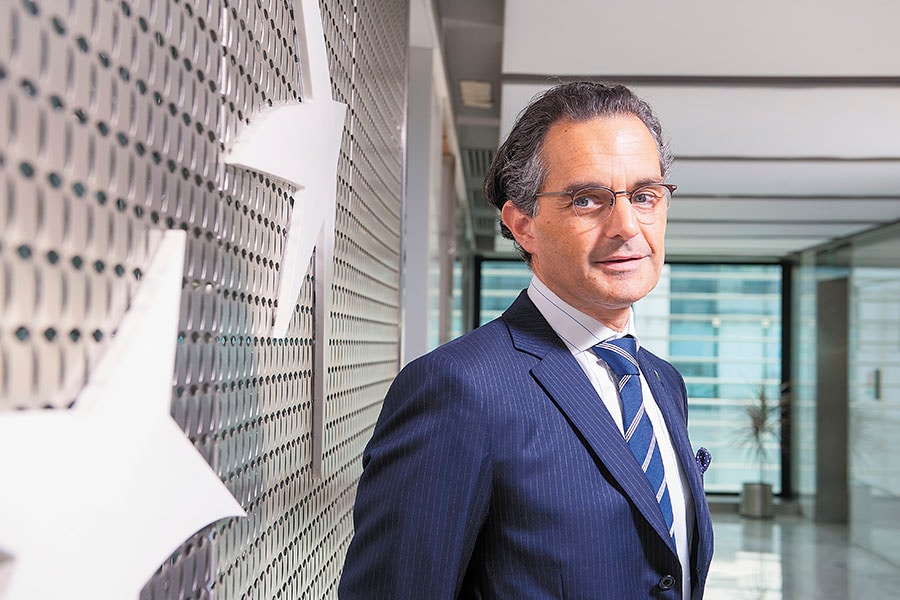The NPA issue has been recognised and is being dealt with: BNP Paribas' India he
Joris Dierckx, country head for BNP Paribas in India, says the BJP government's actions have been positive and the markets have replied suitably



Joris Dierckx, CEO & Country Head , BNP Paribas India
Image: Mexy Xavier
BNP Paribas is one of the few foreign banks in India that commands a strong footprint in retail financial services to complement wholesale banking operations. Joris Dierckx, CEO & Country Head , BNP Paribas India, talks about the country’s sluggish loan market, the performance of the government and the growth strategy for its recently completed acquisition of Sharekhan. Edited excerpts:
Q. How has BNP Paribas fared in the current global environment?
In the US, economic growth is quite stable China is recovering and even the Eurozone’s 1.6 percent GDP growth is not bad. The risk, in such a case, is more on account of geopolitical factors we have to see how they play out.
For BNP Paribas, the group in 2016 had a &euro7.7 billion net profit and that continued in the first quarter of 2017 [the bank reported a 4.4 percent rise in net profit to &euro1.89 billion]. What’s impressive was that the growth was strong in corporate and institutional banking, and there was lower cost of risk.
Q. How critical is India to the BNP Paribas group?
India is an integral part of our Asia-Pacific region the group is focusing on maintaining market share in retail financing and developing consumer finance and digital/mobile banking.
We are investing in the Americas and APAC region we have successfully concluded a big investment plan for 2013-2016 for the APAC region and are now in the next phase of investment, going towards 2020.
Q. How much investment would flow towards Asia?
I would be unable to give specifics, but there is a total budget for acceleration of digital transformation of &euro3.3 billion till 2020 of this, &euro70 million will go towards Sharekhan. [BNP Paribas completed its acquisition of the retail brokerage firm last November.]
In India, we entered a lot of partnerships 12 to 13 years ago. An important evolution [in the bank’s journey] was the APAC investment plan, which was a response to the change in the financial landscape after the 2008 global slowdown. The group decided to go deeper into the local markets they operate in.
We are building the local balance sheet capability. In wholesale banking, we have become relevant in terms of size [in India] as our local currency balance sheet has quadrupled in the past three years to Rs30,000 crore, making us the sixth largest foreign bank in terms of assets [after Citibank, HSBC, Standard Chartered, Deutsche Bank and DBS].
Q. Which business areas will draw more focus in wholesale banking?
BNP Paribas is not just a bank, but also a mix of other businesses. In India, wholesale banking business forms two-thirds of the overall business the balance is other financial services.
For the wholesale bank, there are three main lines—global markets, investment banking, and transaction banking. In global markets, we continue to develop the areas of emerging growth are towards a more open market, with a focus on structured products, particularly structured derivative products. Our institutional brokerage firm BNP Paribas Securities Services has a strong presence in secondary markets. In IPOs, we have the mandate for a few upcoming IPOs, but we will look at a niche approach.
Q. India’s loan growth continues to be sluggish...
There is not much demand capacity utilisation in the industry is still below historical averages and as long as that remains, we don’t expect much capex from the corporate sector. Consequently, there is low demand for financing. How fast this will change depends on domestic demand.
Q. How would you assess the three years of the NDA government?
The actions of the government have been positive and the markets have replied suitably. The GST is a clear example there could be some disruption over the short term because it is something new, but in the long term, it will be beneficial, resulting in the full integration of the Indian economy. There is progress in the banking sector the NPA problem has been recognised and is being dealt with. The merger of the associate banks with its parent State Bank of India is the first step towards consolidation in the sector. There will be more consolidation in due course.
Q. You are one of the few foreign banks to have gone beyond corporate banking...
We have a whole range of business lines available in India. Those that form a part of our retail financial services—wealth management ($8.7 billion as of March 2017), in the mutual fund space (assets under management Rs6,556 crore), bancassurance and life insurance (BNP Paribas Cardif holds a 26 percent stake in SBI Life Insurance), consumer finance through the joint venture (JV) Sundaram BNP Paribas Fund Services (loan book of Rs7,663 crore as on May 31, 2017) and then the equity brokerage Sharekhan [now called Sharekhan by BNP Paribas].
Sharekhan is India’s third largest equity brokerage with 1.4 million customers in 500 cities. We will look to expand our investment and savings-linked products under the Sharekhan umbrella. The key will be digital marketing and client satisfaction.
Q. Why did you rework the Geojit deal?
The proof of the group’s long-term commitment to India was through the JV with Geojit about 13 years ago. Sharekhan and Geojit are complementary, in terms of investments. [But] the independent directors of Geojit had concerns over conflict of interest in the two investments we made. We acknowledged their concerns, although we did not agree with them, and decided to step out of the day-to-day management of Geojit. We gave up the rights for representation on the board and in management, and will just be the largest shareholder in Geojit (33.4 percent).
First Published: Jun 19, 2017, 06:41
Subscribe Now